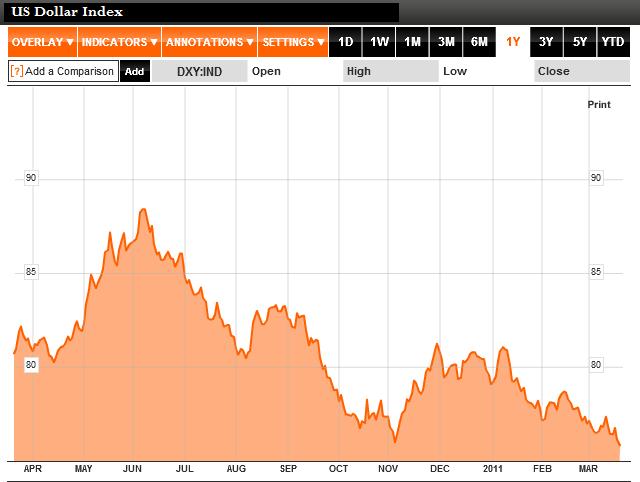March 21st 2011
Does Japan’s “Triple Disaster” Threaten the Dollar?
While analysts have been busy dissecting the implications of the natural disasters that ravage(d) Japan for forex markets, the focus has naturally been directed towards the Yen. Given all the rumors about the liquidation of foreign (i.e. Dollar-denominated) assets, it’s also worth examining the potential impact on the Dollar. In a nutshell, Japan’s holdings of US Treasury Securities are extensive, and even a partial unloading could have serious implications for the world’s de facto reserve currency.
As I explained in my previous post, the Yen rose to a record high (against the Dollar) following the earthquake/tsunami/nuclear crisis because of rumors that Japanese insurance companies and other financial institutions would begin repatriating all of their foreign assets in order to pay for rebuilding. (For the record, it’s worth pointing out again that this has yet to take place, and any repatriation is probably related to the approaching fiscal-year end. Thus, the Yen is being propelled by speculation/short squeeze. Period.)
Indeed, Goldman Sachs has estimated that the rebuilding effort will probably cost around $200 Billion. A significant portion of this will no doubt be covered by the payout of insurance claims. How insurance companies will make their claims is of course, unknown. However, consider that Japanese insurance companies have insisted that they have ample cash reserves. In addition, Japan has what is perhaps the world’s most solid earthquake reinsurance (basically insurance for insurers) program, which means primary insurance companies can basically pass these claims up the chain, perhaps all the way to the government.
As for whether the Bank of Japan will sell some its $900 Billion in Treasury holdings, this, too appears unlikely. First of all, the Bank of Japan is doing everything in its power to soften the upward pressure on the Yen, which would not be consistent with selling any of its Dollar-assets. Second, the Financial Times has further argued that they will be especially unlikely to sell US Treasury securities, because they would lose money on (US Dollar) currency depreciation. Besides, any assets that are sold now to pay for rebuilding would probably need to be repurchased later in order to restore balance sheet equilibrium.
While I am on the topic, I want to draw attention to a recent Treasury report that documented the overseas holdings of Treasury securities. The major surprise was China, whose holdings were revised upwards to $1.18 Trillion (from $892 Billion), which means it is well-entrenched as the most important creditor to the US. However, this was offset by a 50% drop in the Bank of England’s holdings, caused perhaps by a change from US debt to British debt.
As I have written in the past, it seems unlikely – for political, economic, and financial – reasons that China will move to pare its Treasury holdings in a significant way. Simply, it has no other viable options for investing the foreign exchange reserves that it is forced to accumulate because of the Yuan-Dollar peg. Other doomsdays have speculated that the crisis in the Middle East will end the “petro-Dollar” phenomenon, whereby oil exporters settle their bills almost exclusively in Dollars and use the proceeds to buy Treasuries. While US influence in the Mid East may indeed wane further as a result of the ongoing political turmoil, I don’t think this will force a change to the PetroDollar phenomenon, which is due as much to unavoidable trade surpluses as it is to settling oil transactions in US Dollars.
There is certainly some concern about what will happen when the Fed wraps up QE2 later this year and stops buying Trreasury securities. Two prominent investment companies (PIMCO and Vanguard) have warned that this will cause bond prices to fall and interest rates on debt to rise rapidly. While this is certainly possible, demand for Treasuries will remain strong for as long as the current risk-averse climate remains in place. In addition, given that the US Treasury is not in danger of defaulting anytime soon, yields reflect expectations for inflation and interest rates more than supply/demand for the bonds themselves. Finally, when the Fed stopped buying mortgage backed securities in 2010, mortgage rates fell, contrary to expectations.
In short, the Dollar might continue to fall against the Yen as speculators cover their short positions, but not because of any fundamental reasons. On an aggregate basis, the never-ending string of crises won’t cause the Dollar to collapse. If anything, it might even bring some risk-averse capital back to the US and re-affirm the Dollar’s status as global reserve currency.





March 22nd, 2011 at 3:14 am
Any thoughts now? We appear to still be moving for a weaker dollar and it’s 4:12AM Tues Morning, the Kiwi, Euro, Aussie, everything is breaking new highs and the USDJPY is just sitting in a unearthly flag.
I would have to argue, macro arguments over the dollar have seen seriously wrong everywhere recently. Something is cooking in the Forex markets it seems, lots of uncertainty over the dollar but I suppose as long as they are trading oil with it we are fine LOL
March 24th, 2011 at 6:50 am
With the view that yields expectation for inflation, it’s interesting to note that one of the few assets that kept strengthening against most of all other assets is of course Gold, which is currently hovering at all time high levels.
Gold is the traditional safe haven for those fearing inflation.